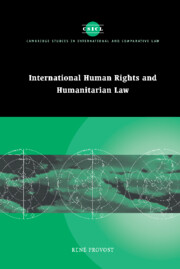Book contents
- Frontmatter
- Contents
- Acknowledgments
- Table of cases
- Table of treaties
- Table of other international instruments
- Introduction
- PART I Normative frameworks
- PART II Reciprocity
- PART III Application: law and facts
- Introduction
- 6 Areas of legal indeterminacy
- 7 Legal effect of characterisation
- Conclusion to Part III
- General conclusion
- Bibliography
- Index
- CAMBRIDGE STUDIES IN INTERNATIONAL AND COMPARATIVE LAW
7 - Legal effect of characterisation
Published online by Cambridge University Press: 07 September 2009
- Frontmatter
- Contents
- Acknowledgments
- Table of cases
- Table of treaties
- Table of other international instruments
- Introduction
- PART I Normative frameworks
- PART II Reciprocity
- PART III Application: law and facts
- Introduction
- 6 Areas of legal indeterminacy
- 7 Legal effect of characterisation
- Conclusion to Part III
- General conclusion
- Bibliography
- Index
- CAMBRIDGE STUDIES IN INTERNATIONAL AND COMPARATIVE LAW
Summary
In considering the indeterminacy of the definitions of armed conflict and state of emergency, human rights law may appear to stand at an advantage with respect to humanitarian law because it is lex generalis applicable at all times, save in situations where a state of emergency is shown to exist, when it can be largely suspended. Humanitarian law, on the contrary, is lex specialis, requiring characterisation of a situation as an armed conflict before becoming applicable. The distinction is somewhat formalistic in the context of the fluid application of both human rights and humanitarian law, merely offering a rebuttable presumption mostly relevant in case of review of the state's characterisation before a judicial body. In the ordinary application of the law, the existence of a legal presumption will have little effect on a state's power to characterise a situation as an armed conflict or a state of emergency.
Despite some inroads over the last few decades, the whole edifice of international law remains built on and around the state. Considerations of state sovereignty mean that each state may make a preliminary appreciation for itself of any situation of fact or law in all areas of international law, including human rights and humanitarian law. Application by the state of somewhat indeterminate norms to often ambiguous facts cannot be totally discretionary, as this would contradict the postulated normative and mandatory nature of international law. There are necessarily some limits to the state's power to characterise.
- Type
- Chapter
- Information
- International Human Rights and Humanitarian Law , pp. 277 - 337Publisher: Cambridge University PressPrint publication year: 2002
- 2
- Cited by

